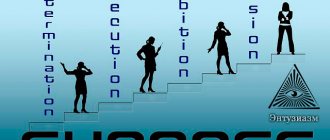Any society has developed certain moral standards. They are not enshrined anywhere at the legislative level, but are passed on by word of mouth or through special literature. There are no sanctions for failure to follow moral standards. The maximum that someone who fails to comply with them can run into is public censure.
good child
Don't blindly follow other people's opinions. Developed moral qualities are the basis for interacting with people and achieving success. Therefore, it is important to train them for both adults and children.
What are moral qualities
Moral qualities are closely related to the concepts of good and evil. Certain actions in a particular society are considered positive, others - negative. Any person should be able to take responsibility for his actions, and moral qualities are guidelines pointing to the direction in which to move and what should not be done.
Definition in psychology
Many definitions have been given to the concept of “moral qualities”. The most common of them sounds like this. Moral qualities are the totality of all characteristics that speak of a person as a conscious person. They are expressed in a person's actions and manners. By his behavior, outsiders can judge the presence or absence of specific character traits.
All these moral and ethical qualities are divided into three categories:
- Can. These are individual rights that do not conflict with either social norms or the values of a particular person. They don't harm other people, but they don't have to. For example, everyone has the right to manage their money as they wish.
- It is forbidden. These are actions that can cause negative emotions in strangers or even cause harm to them. Some of them are spelled out in the criminal code. An example of a rule from the “no” category - it is prohibited to manage other people’s money if the owner has not lent it or has not authorized it.
- Need to. These are rules that have social value, but are not important for the person himself.
Important ! Moral qualities can conflict with each other. For example, a doctor does not want to treat a murderer and rapist, but wants to do his job responsibly.
The moral qualities of a person are based on intellect, will and emotions. A person has to constantly solve ethical problems. The answer to how best to act is not always on the surface.
If a person does something unacceptable, he feels guilty, his conscience awakens when he does something wrong. This mechanism shows that these actions should not be performed in the future. Conscience is the emotional component of moral qualities.
Kind child loves a cat
Will is realized when a socially significant action has no value for the person himself.
Examples of morality
Whenever it comes to issues of moral behavior, there is an internal assessment of actions on a scale of good and evil. To say whether an action is moral or not, you need to take into account all the circumstances of the situation:
- Tell only the truth, do not deceive anyone . However, the concept of morality will be absent if speaking truthfully can betray a friend.
- Respect other people's right to their own lives . At the same time, euthanasia causes a mixed reaction in society.
- Show generosity . However, giving too much can corrupt.
- Be true . Shows of loyalty are moral as long as they do not turn into fanaticism.
- Be a good citizen of society.
- Live a selfless life . Altruism is the highest manifestation of morality. When moral responsibility for people goes beyond personal well-being.
Indicator of moral maturity of a person
Volitional personality traits - what is it in psychology, their formation
In everyday life, morality is synonymous with the concept of a “highly moral personality.” To become like this, you need to become psychologically mature. Here are some criteria for a moral personality:
- Responsibility is a person’s ability to understand that his actions have consequences.
- Internal locus of control. A morally mature person will not shift responsibility to other people. Instead of looking for someone to blame, he will think about how to solve the problem or correct the mistakes he has made.
- Adequate self-esteem. Any moral person soberly assesses his strengths and weaknesses and acts based on them. He actively applies the former, and compensates for the latter or tries to correct it. A mature person will not lean to the other extreme - hyper-responsibility. Not everything depends on her, so she clearly distinguishes which situations were provoked and which happened by chance.
- The ability to reflect: analyze one’s thinking, actions and the situation in which a person finds himself. This allows you to draw conclusions and put them into practice.
- Willingness to be punished or experience the unpleasant consequences of one's actions. Lack of desire to run from problems caused by mistakes.
- The ability to predict the consequences of your actions before they are committed. For example, a person addicted to alcohol does not think about the consequences of his drinking. If he had thought about it seriously before he poured himself a drink, he might have been able to refrain.
Thus, moral maturity goes hand in hand with personal maturity. Its central concept is responsibility, which includes all the points described.
A good elephant is an example of morality
Important ! The formation of a highly moral personality is a long process that begins when a person is a preschooler. Kindergartens use different methods to develop intelligent individuals who will show respect for themselves and others. At school they teach social studies, where they talk about morality.
What is good? (6th grade)
The famous writer Mark Twain said:
“Kindness is something that the deaf can hear and the blind can see.”
So, what is good? This is a very good quality of a person, thanks to which other people receive joy and a smile. Goodness makes people happy.
A child protects a dog from the rain, thereby committing a good deed
Very often, goodness and kindness are associated with happiness. When a person is kind, he is respectful
relates to elders, helps neighbors without expecting anything in return.
Sometimes, when a person finds himself in a difficult life situation, it is enough for him to hear a kind word and this makes his soul feel better. There are many examples of kindness and we encounter this wonderful quality every day.
Kindness makes the person himself happy. And also, in order to be kind, you must be able to forgive; you should not hold a grudge and want to take revenge on the offender. You need to be able to forgive sincerely, with all your heart.
In all fairy tales, good always triumphs over evil. In life, you also need to be able to be kind and give joy to others.
Such a human quality as kindness is not characteristic of everyone. The word kindness itself comes from the word good.
It is thanks to this quality that the world becomes better, improves every day.
It is thanks to goodness that we have blue skies above our heads.
You should never forget about this, you must continue to give kindness to people and do good deeds.
Types of moral qualities
Negative character traits - how to find and correct negative qualities
There are many classifications of types of moral qualities; if we summarize them, we get the following categories:
- Ethical. Norms that prescribe what is considered positive and what is considered negative.
- Moral. Rules of behavior based on love for one's neighbor. Although at first glance ethical and moral standards do not differ from each other, this is not entirely true. Even criminal gangs have their own ethics, which allow them to kill, steal and rape. But such actions are not moral, because they do not contain love for one’s neighbor. Also, there can be many ethics, but only one morality.
- Religious. These are moral qualities considered ideal in a particular religion. Previously, they were considered the main ones, and in a number of theocratic states they are included in legislation even now.
- Microgroups. These are norms accepted in a certain group. They can either be identical to the morality accepted in a certain territory, or be independent of it.
Libra is a common example of moral character.
Important ! This division is quite arbitrary. For example, the idea of what love for one's neighbor is varies from person to person. Religious beliefs are also based on morality.
Rules of morality
Each person has their own. Moral qualities depend on the level of personal development. However, humanity has developed universal rules of morality:
- Golden rule: don’t do to someone else what you wouldn’t want them to do to you.
- Be honest with yourself. This means being able to admit your own mistakes.
- Put yourself in another person's shoes. This will help you feel people better.
- Control the manifestations of negativity in yourself.
- The first impression may be false. After all, what is morality if not the search for a deeper meaning.
Basic moral qualities
Qualities of a man - bad and good character traits, what to cultivate in yourself
The division of qualities into good and bad is only conditional. The same characteristic is considered useful or harmful depending on the situation. For example, prudence can develop into indecisiveness. Lack of conflict can develop into weak character. Thrifting can seem like stinginess. Pride develops into arrogance. In any case, there are a number of qualities that are considered positive or negative.
Positive character traits
A quality that helps a person live and benefits people is considered positive. Such high, worthy characteristics from a spiritual point of view are considered:
- Determination. The ability to make drastic changes in life, readily accepting the possible consequences.
- Courage. The quality with which a person can do something despite fear.
- Strength of will. The ability to resist momentary temptations in favor of a prosperous future.
- Generosity. When a person easily partes with his resources for the benefit of another. Although generosity is usually associated with money, there can be other resources, such as time. Sometimes the latter is valued even more by loved ones. In general, you can be generous in a broad and narrow sense.
- Determination. This quality is considered especially positive when a person and his immediate environment strive for the same results. Then he becomes a leader, thanks to him, all members of the group begin to live better. If goal-orientation is focused solely on one's own goals, it can be destructive because it does not take into account the interests of other people.
- Decency, honesty. This includes the lack of desire to hide something from your loved ones, openness to them.
- Empathy. The ability to sense another person's emotions and act on them.
All these positive qualities can play a cruel joke, both on the person himself and on other people. Therefore, it is important to remain flexible and adapt to the situation.
Negative qualities
By analogy with positive qualities, those personality traits that harm oneself and others are considered negative. Many of them are the opposite of positive aspects: squandering, indecisiveness, callousness, deceit and others. Here are some other negative qualities:
- Inappropriate careerism. The case when excessive determination has a negative impact on other people.
- Aggressiveness. When a person does not know how to competently redirect negative emotions, causing harm to others.
- Irresponsibility is the thoughtless commission of actions that obviously have negative consequences.
- Parasitism is when a person takes the resources of another person without giving anything in return.
- Corrupt practices.
Ways to develop moral qualities
The development of any positive characteristic is based on the development of appropriate habits. The easiest way to start is with one good deed a day, even a small one. After some time, this will become a habit; helping people will begin automatically.
You can reward yourself for strong-willed victories. For example, if you managed not to show a negative quality, you can praise yourself and do good.
So, moral and ethical qualities are characteristics of a person that can be described through the concepts of good and evil. The same qualities may manifest themselves differently in different situations, but there is a certain set of characteristics that people consider predominantly positive or negative.
The concept of morality from an objective point of view
What is the objective concept of morality? As mentioned above, the concept of good and evil in the modern world is distorted almost beyond recognition, and a person can do evil, being in the complete illusion that he is a highly moral person and is doing the right thing. Moreover, sometimes people harm those closest to them and are in the illusion that they are doing good. This is what the quote says: “The road to hell is paved with good intentions.” Sometimes people who want to do good cause more evil than all the evildoers in the world combined. Let’s not go into details; it’s better to consider how to act so that good is objective and not subjective. The entire Universe, all living beings, one way or another strive for evolution - consciously or unconsciously. Therefore, good from an objective point of view is that which leads to evolution. And if a child needs to be punished and taught a lesson, or even slapped on the head, so to speak, to stimulate the Sahasrara chakra for “micro-enlightenment,” then this needs to be done. It is important to act not out of anger, but out of compassion, with the full understanding that your action will lead to evolution and to the fact that the child will learn a useful lesson for the rest of his life. And this will be a blessing. And what leads to degradation is evil, even if it looks beautiful and noble. When parents generously give a child useless gifts, pamper him and feed him sweets - all this, of course, looks very touching, but what result will this lead the child to? The question is rhetorical.
Thus, the golden rule of morality “Do to others what you would like to receive yourself” works only if a person has a more or less adequate understanding of good and evil, as well as adequate motivations and aspirations in life. And if a person strives for self-improvement, then it is obvious that he does not strive for entertainment and pleasure, which means he will not show this to others, so as not to receive the same for himself. Therefore, before applying the golden rule of morality in life, one should think thoroughly about the concept of good and evil and what is useful and what is harmful. You should think about it.
Fundamentals of Morality
What are the foundations of objective morality? One of the most moral paradigms is set out by the sage Patanjali in the Yoga Sutras. Yoga practitioners are instructed to establish themselves in moral discipline before undertaking the practice. What does the sage Patanjali offer us? There are only five basic instructions for a harmonious life. But performing at least one of them perfectly is not an easy task. The five precepts of morality are set out in the first stage of Patanjali's eightfold system, the so-called Yama:
- Ahimsa - non-violence. Non-violence is prescribed at three levels: body, speech and mind. And if at the level of the body it is more or less easy to observe ahimsa, then at the level of speech, and even more so at the level of the mind, the task is very difficult. But it is at the level of the mind that the evil that we broadcast into the world arises.
- Satya - benevolent truthfulness. A person who tells a lie primarily harms himself. Because a lie creates a certain veil of illusion around the one who utters this lie. And the person begins to live inadequately.
- Asteya - non-appropriation of someone else's. According to the law of conservation of energy, we will still lose everything that we have unfairly appropriated to ourselves. So is there any point in taking someone else’s property, causing the person suffering, if we lose it anyway?
- Brahmacharya is abstinence from sensual pleasures. Any sensual pleasure is a loss of energy. And the lower and rougher the pleasure, the more energy we lose. And if a person has some kind of goal or purpose in life that he is called to fulfill (and everyone has one), then it is unacceptable to waste his energy on passions and pleasures, since the amount of energy each person has is limited.
- Aparigraha - non-covetousness. In addition to pleasures and entertainment, material goods also waste our energy. Therefore, the accumulation of material wealth for the sake of accumulation itself is simply stupidity, which will waste our energy. Shantideva said well in his brilliant work “Bodhicharya Avatara”: “As if robbed, I will leave this world.” This is true. We will leave everything material that we accumulate here. And even our own body does not belong to us, let alone material accumulations. Therefore, it is unwise to waste energy on their accumulation. It is much wiser to spend it on doing good deeds and changing the world around for the better. Since we will be able to take experience in practice, gratitude and good karma into our future life. Therefore, only this should be accumulated.
These are Patanjdali's five basic precepts for yoga practitioners. There are also five additional ones. Unlike the first five, which prescribe to abstain from immoral acts, the second five prescribe what should be cultivated in oneself. However, one who can master at least five basic moral precepts will already be a worthy and noble person, and he will not be in danger of accumulating negative karma. But to do this, you need to master these principles perfectly. In modern society this is far from easy to do, but the one who walks can master the road.
Sources used:
- https://vplate.ru/etiket/nravstvennoe-povedenie/
- https://wlooks.ru/etiket/nravstvennoe-povedenie/
- https://ethicscenter.ru/nravstvennoe-povedenie.html
- https://sociologicheskaya.academic.ru/875/moral behavior
- https://www.oum.ru/yoga/samorazvitie-i-samosovershenstvovanie/nravstvennost-osnova-garmonichnoy-zhizni/
Definition
Moral qualities are a set of character properties that reflects a person’s inner world and worldview, his judgments about norms of behavior, which to a certain extent helps to assess the level of his spiritual development. Moral qualities include a set of human virtues that are developed in the process of accumulating practical, life experience.
Under the influence of external and internal factors, the formation of behavior patterns encouraged in society occurs, which further determine the characteristics of the individual’s actions, including in personal relationships. The definition of a term in psychology presupposes the formation of a system of rules that regulate human activity within society. Distinctive signs of positive moral qualities:
- Unselfishness.
- Lack of pragmatism.
- Altruistic, selfless.
Moral qualities are such spiritual values that comprehensively characterize a person, personify his inner content, which allows us to draw conclusions about a person’s psychotype. High moral qualities distinguish generous, noble, truthful people. The formation of moral qualities is carried out under the influence of intellect, emotions, and will. They can be:
- Positive (justice, honor, dignity). Character traits that do not conflict with the internal beliefs of the individual.
- Encouraged (responsibility, sense of duty). They encourage an individual to take certain actions that are approved by society, regardless of the internal attitudes of the individual himself.
- Negative (envy, money-grubbing, hypocrisy, cynicism). They contradict generally accepted principles and cause personal hostility on the part of other members of society.
Often the moral qualities inherent in one individual come into conflict, forcing him to experience emotions and make difficult moral choices. An example of a conflict between the principles of morality and morality and a person’s inner beliefs can be the moral choice that faces a doctor who is forced to treat a criminal.
The doctor experiences personal hostility towards the patient who has broken the law and committed an offense, but is bound by official duties and ethical standards and is forced to provide medical care to everyone in need. A similar example can be given with the participation of a lawyer who defends a criminal in court, experiencing negative emotions in connection with the assessment of his actions.
Features of formation and types
Moral qualities are character traits that are formed in the process of a person’s theoretical thinking, contribute to his self-determination and the ability to adhere to an objective position, moving away from subjective assessment.
Moral qualities are personal attitudes that regulate the behavior of an individual within the framework of relationships with other members of society. The value system is based on feelings and emotions approved in society. What are the moral qualities:
- Mercy.
- Compassion.
- Sympathy, empathy.
- Self-esteem.
- Feelings of shame for committing negative actions.
One of the main regulators of an individual’s behavior is conscience – a sense of moral responsibility to other people and society as a whole for actions taken. The degree of manifestation of conscience reflects the level of an individual’s ability to independently determine moral duties and exercise moral self-control over their actions.
The formation of moral values occurs under the influence of many factors - upbringing, personal example of an authority figure, ethical standards preached in society. From childhood, an individual is instilled with the idea of positive behavioral models. The list of rules is almost limitless:
- Love your parents.
- Take care of elderly relatives.
- Do not take other people's things without asking.
- Don't lie.
- Do not offend the younger and weaker.
- Be loyal to the Motherland.
- Be obedient and hardworking.
The list of rules varies depending on the level of moral and spiritual development of the parents. In some cases (when the moral standards of the individual parent are deformed) it may contain attitudes that contradict generally accepted moral principles. When instilling moral values in a child, parents give examples that embody positive and negative behavior patterns.
Moral assessment
An act is an element of moral behavior. An action can be active or passive (the absence of any action in a situation that requires an active response). The moral assessment of actions is the determination of the degree of conformity between the behavior of a particular individual and generally accepted behavioral models encouraged by society. To adequately evaluate an action, they rely on the following criteria:
- The result of the action.
- Ways to achieve the goal. If a person resorts to antimoral actions to achieve what he wants, even if the result is positive, the overall impression of the individual’s behavior is negative.
- Motives that prompted an individual to act. If a person was motivated by noble impulses even in the event of a negative result condemned by society, the negative assessment is softened.
By adhering to chosen models of behavior, an individual finds a balance, a point of balance between his own aspirations, beliefs and standards established in society.
Categories of morality
These are general conceptual elements that describe this subject matter. Moral principles are based on them. Moral categories include:
- good and evil as opposing criteria for evaluating phenomena;
- justice is a measure of the distribution of benefits;
- honor stands guard over compliance with a person’s internal code;
- debt is something for which a person is responsible in life;
- conscience is an indicator of critical assessment of actions;
- happiness as a result of moral behavior.
Examples
A morally mature person is the personification of successfully completed socialization. This is a person who has learned the norms of behavior encouraged by society and uses them in practice as a guide for his actions. Moreover, the desire to comply with generally accepted behavioral standards is dictated not by fear of reproach, punishment or possible benefit, but by personal beliefs, motives and principles. Sociologists give numerous examples of the manifestation of moral feelings:
- Humanity, philanthropy.
- Hard work, diligence.
- Loyalty, devotion.
- Sense of tact, delicacy.
- Spirituality, religiosity.
- Sincerity, openness.
Altruistic behavior patterns are inherent in many animals. Often females raise offspring of another species and show selfless care for their young. Helping relatives of a similar genotype contributes to the survival of competitive species, which significantly expands the understanding of natural selection of individual orientation. Such behavior is due to natural selection of group orientation; it helps the survival of the entire population.
Drawing analogies, we can say that the moral behavior of an individual is laid down in biological programs and is implemented at a subconscious level. People are biological organisms that are characterized by a certain pattern of behavior on a subconscious, reflex level. Among the reflexes inherent in nature and correlating with the concept of morality, it is worth noting:
- Maternal instinct.
- Caring for a partner with whom the instinct of procreation is realized.
- Caring for relatives and the population (society) as a whole.
- A sense of patriotism (love for the Motherland, place of birth).
Vivid examples of spontaneous morality are actions that are based on a person’s subconscious desire to follow norms that contribute to the preservation of the population as a whole. A woman breaks off a relationship with her lover upon learning that he is married, subconsciously assessing such a relationship as unpromising (in relation to procreation) and immoral (causing moral harm to the legal spouse of the partner, and therefore threatening a relative of a similar genotype and population). Special manuals provide other examples of spontaneous morality:
- Providing assistance to an elderly person who is unable to cross a busy highway on his own.
- Stopping a personal vehicle and assisting a person who is standing on the side of the road and gesturing for help.
- An involuntary desire to help carry a heavy bag to a person who, for various reasons (old age, disability, physical weakness), is unable to cope with the task.
The presence of immoral people who violate moral standards testifies to the relative freedom of a person from the influence of biologically embedded models of normal behavior. A person is endowed with intelligence, the ability to think logically, predict, plan and independently choose moral values. Examples of the deformation of universal human norms can be traced in historical periods of totalitarian regimes, for example, Hitler in Germany, Pinochet in Chile, Stalin in the USSR.
Moral qualities are an indicator of a person’s level of intelligence and spiritual development, a reflection of the degree of his socialization and the presence of self-control. Morality is the basis of humanism, humanity and civilization. The collapse of moral ideals is accompanied by a surge in crime in society, indicates the degradation of members of society, and foreshadows large-scale humanitarian disasters.
We are glad to welcome you, dear readers of Valery Kharlamov’s blog! Morality is the basis, the rules on which a person relies in his activities and life in order to achieve success, respect and recognition. And today we will look at what moral qualities a person has, so that you understand what you need to pay attention to if you want to improve and develop.
Content:
List of qualities
Responsibility
A person must understand what consequences his activity entails or, conversely, inaction. Unfortunately, it is characteristic mainly of developed and mature people, independent and with self-respect. Because it is difficult to be responsible for your actions if you are used to someone else solving issues and problems. And also, if there is an opportunity to hide, so to speak, lie low and expect that everything will resolve itself.
But it is also difficult to stand aside and feel guilty for what they have done if a person is confident in himself and understands that he simply cannot look others in the eye, and also treat himself well, knowing the truth about his cowardice.
The formation and development of responsibility is ensured by such a method as the imposition of fines. That is, for every offense you need to do something that you don’t really like, but is useful. In terms of education, raising children, everything is clear, they know the rules and restrictions, if you break them, retribution will follow.
But in relation to yourself, you will have to use self-control and endurance in order to bring what you started to the end, and still deprive yourself of something in case of misconduct.
Honesty and openness
These seem to be positive qualities of a moral person, but you should be attentive and careful so as not to harm anyone. Suppose, by opening your soul to a perverted narcissist, you will only give him trump cards to control you, and save time for independently searching for your weaknesses. You will learn more about such a person from this article, and then you will understand why this is dangerous.
So, before you trust completely, be careful and attentive. But you must always be as honest as possible with yourself. It’s more pleasant to live in illusions, but no one has canceled reality, and if you ignore it, there is a risk of getting hurt, or even worse, crashing.
Patriotism
It manifests itself not only in the form of love for one’s homeland, city, planet in general, but also in showing interest in the traditions of one’s country. It is important to know the history of your ancestors, respect and appreciate them in order to pass on the accumulated knowledge further to your descendants.
Patriotism manifests itself in the desire to change for the better, if not the planet, then at least the city, the street, and, ultimately, oneself. So, what do you know about your family? Who did what, what kind of life did they live, what were they remembered for, what role did they perform during their lifetime, what did they strive for?
Humanism
This is humanity, care, empathy. The problem is that feelings happen, it’s not easy to cause them on purpose. Therefore, if a person does not experience sincere empathy, if he is simply accustomed to relying on some kind of insensitivity for some reason, he will have to make a lot of effort to develop this humanism.
Try to notice and be aware of the moments when you feel gratitude towards other people. Perhaps this will help develop your humanity. Yes, it’s difficult to just love everyone around you, because it’s about depersonalization and in general, you can dry up in one fine moment.
But if you identify the people who surround you and are interested in them, keep track of how they were useful, and how you can help them in return, then it becomes much easier. At the very least, a figure appears towards whom one can justifiably feel something.
Politeness
Allows you to think about a person that he is developed, well-mannered and harmonious. It is pleasant to deal with him and trust arises much faster, if only the politeness is sincere, and not pointedly pompous, with the goal of getting what you want by using someone else.
Discipline and culture of behavior
There are rules, foundations and norms in society, and in order to be in it, it is important to comply with them. Otherwise, you may even end up in prison.
There is such a definition as a deviant person is someone who is not able to behave in a disciplined manner and observe norms and laws. You will learn more about what this means and how to cope with deviance in the article at the link.
Loyalty
It is highly valued in the modern world, but it presupposes not only loyalty to your partner, but also to yourself, as well as to your given word. Therefore, if you want to be valued and trusted, always keep your promises. As a last resort, warn and explain if difficulties arise, so you can save the relationship and “face”.
Collectivism
Regardless of your personality type, that is, even if you are an introvert, it is important to be able to cooperate and conduct joint activities with the group in which you are. A person needs to feel that he belongs to some community. This allows you to feel support that there are a lot of similar people behind you, even classmates, colleagues, etc.
But in addition to belonging, you must be able to interact with those around you. Not only compete and defend yourself and your interests, but also cooperate, share something, find compromises and help.
Intelligence
A moral person must be intellectually developed, but this does not mean knowledge of formulas and theorems, but the level of his awareness. That is, to what extent he can rely on his experience and feelings, how he distinguishes between what is good and what is bad, whether he knows how to make choices and whether he generally understands what he wants from life and how he can achieve it.
You need to learn to feel every moment of your life, notice the present and appreciate it. Then time will not fly by in vain, depriving you of opportunities. Check out the article on mindfulness.
Hard work
Oddly enough, slackers and rakes are rarely considered moral people, as well as those who achieved success undeservedly, and even worse, “by going over their heads.” Be diligent and do not stop in the face of difficulties. Then at least you can recognize your contributions and efforts when you achieve your goals and dreams.
Tact
It is a kind of sense of proportion, what can be said and what cannot, how close one can get, what questions will be inappropriate, and so on. A tactful person appreciates another person's boundaries and notices when the other person has lost interest in order to avoid appearing intrusive.
By the way, tactfulness significantly reduces the number of conflicts and tense situations.
Spirituality
Morality is closely related to the moral and spiritual qualities of a person. That is, it is important not just to profess some religion, but to keep faith in something in your heart, pay attention to self-development, reading books, any practices that give harmony and peace, as well as an understanding of your purpose. You will find detailed recommendations on how to increase your spiritual level here.
Respect for the older generation
It is a small branch of humanity, its important component, but we decided to pay special attention to this point. Without respecting your past and origins, it is impossible to be grateful, and accordingly, there is no sense of self-worth and good self-esteem.
No matter what our parents and grandparents are like, no matter what kind of life they lived and what kind of relationship they developed or did not develop with them, there is always a moment for which we should thank them, and for which they are worthy of respect.
Do you know what this moment is? This is a choice once made to save life, no matter for you or your dad, mom... Because that is why you now have the opportunity to read these lines and just be. That is why you have a loved one, a close person or friend, an idol, etc. And it is important to teach children to respect the elderly, help them and, of course, pay attention, which they sometimes lack.
Caring for the environment
Care for nature, our smaller brothers. We have long moved away from primitiveness, so a moral person will put out the fire before leaving the forest. He will clean up the trash after himself and will not abuse animals, if only because he has compassion.
Text of the book “Ethics: A Cheat Sheet”
9. ETHICAL MEANING OF HAPPINESS
Happiness
- a state of lasting satisfaction from the experienced pleasure and fullness of life. It accompanies every moment of human life as a manifestation of the highest value. Therefore, it is closely connected with the fate of a person. It was in the sense of the goal of all human aspirations that happiness was understood in the era of antiquity.
Eudaimonism
– an ethical direction that considers happiness as the motive and goal of all human aspirations. Adherents of eudaimonism considered happy the person whose physical and spiritual abilities could develop unhindered. Representatives of eudaimonism at different times were Socrates, Epicurus, B. Spinoza, G.V. Leibniz, L. Feuerbach, G. Spencer and others. The foundations of the doctrine of happiness were laid and developed by the ancient schools of the Hellenistic era: the Stoics, Epicureans and skeptics.
Happiness
- dispassion and ascetic lifestyle, accompanied by renunciation of earthly feelings.
This is the essence of the Stoics' understanding of the nature of happiness.
The main principle of a happy life, in their opinion, should be apathy. Apathy is independence from feelings and passions. Therefore, a happy lifestyle is the destiny of a sage. He is always devoted to reason, and his statements are correct and impartial.
Happiness
– freedom from passions and fearlessness before death and mortal pain.
This was the ideal of a happy life for the skeptics.
It was based on the principle of ataraxy.
Ataraxia is a moral principle according to which happiness lies in peace of mind and serenity. The path to happiness lies through following another principle - the principle of epoch. Epoche
- abstinence from judgment, followed by calmness.
Happiness
- the desire for pleasure and pleasure.
This is the understanding of happiness by the Epicureans,
who distinguished two types of happiness:
1) the highest happiness belonging to the gods, it cannot be increased;
2) happiness that is achievable for a person and allows for multiplication.
The Epicureans did not see in every pleasure the guarantee of a person’s future happiness, but only in those that correspond to his rational nature. Happiness is impossible for a person who lives unreasonably, since reason is the highest good for a person. The moral meaning of happiness consists in a person’s desire for joy, pleasures and pleasures, but only those that do not harm his spiritual and physical health. Happiness is driven by human desires, but not all of them are morally justified and are often achieved to the detriment of the person himself and the people around him. Otherwise, the pursuit of happiness turns into unhappiness. Misfortune
– a character trait of a person that leads to mistakes, misdeeds, adversity, illness or loss of loved ones. The pursuit of pleasure does not guarantee happiness and, on the contrary, self-denial is a closer path to it. Ultimately, happiness results from living a virtuous and morally consistent life.
10. JUSTICE AS A REGULATORY PRINCIPLE OF PUBLIC AND INDIVIDUAL RELATIONS
Justice
- a principle that regulates the relationship between people as members of society regarding the distribution of social values, which are freedom, favorable opportunities, income, signs of prestige and respect.
Aristotle,
and along with it, all ethical thought distinguishes between two types of justice:
1) distributive justice
– distribution of honors, property and other material benefits among members of society according to merit and in proportion to merit;
2) fairness associated with exchange
– equalization of the parties involved in the exchange, regardless of their merits.
In both cases, there is implied agreement between members of society regarding the principles of their lives. These principles may change, but the understanding of justice depends on what rules have been established in a given society. Their violation is perceived as injustice.
Justice
- a principle of individual behavior that sets a limit to arbitrariness. It requires respect for the rights of another person, non-violation of the person and her property. The main requirement of justice is respect for the rights and dignity of people. It guides a person to fulfill his obligations to other people. Obligations can be presented in the form of legal laws, constitutional rights, moral ideas.
The distinction between justice and injustice is established individually for each individual. This issue is discussed in detail in Plato's dialogue Gorgias. Justice
is considered as the equality of people before each other, expressed in the commission of actions that do not violate the rights and freedoms of other people.
To be fair or to be punished for injustice is regarded as happiness for a person, because the one who acts unjustly and remains unpunished serves evil and does not even have an idea of \u200b\u200bwhat the true good is. By incurring punishment, a person gets rid of the corruption that darkens the soul. In this sense, it is better to endure injustice than to inflict it on other people. Injustice
is the greatest evil for the one who commits it, because it not only makes him morally worse, but also deprives him of the opportunity to correct his own moral mistakes. For the same reason, injustice cannot be justified either by law or custom.
11. BEHAVIORAL ANALOGUES OF MORALITY IN LIVING NATURE
The theory of the English naturalist Charles Darwin (1809–1882) about the evolutionary origin of species through natural selection led to the development of a new approach to the problem of the origin of morality and ethics. Darwin explains the origin of moral feeling from feelings of sociability, which exist instinctively or are innate in lower animals. Sociability instinct
- a feeling that gives pleasure from being in the company of individuals similar to oneself and the empathy or sympathy felt towards them.
Sympathy
is a feeling of camaraderie and mutual experience of the same impressions. To varying degrees, developed intelligence prompts animals and also humans to feel shame and dissatisfaction due to the fact that their social instinct has given way to other instincts. The reason for the strengthening of the social instinct and mutual sympathy is habit. From observations carried out on the lives of animals, it became obvious that they are capable of sympathy not only in pleasures, but also in misfortunes. From here the idea of the existence of mutual assistance among animals as the basis of morality is formed. Despite man's need to develop his own individuality and the insignificant influence of social instincts on his life, he is a sociable creature. The ability to sympathize with one's relatives is preserved in the human subconscious and is supported by reason, experience and the desire for approval from other people.
Darwin came to the conclusion about social instinct as the source of development of all moral principles. Its development was greatly facilitated by natural selection due to its usefulness for the preservation and development of the species. Natural selection comes into conflict with the instinct of self-preservation and the instinct of affection of parents for their offspring and gains the upper hand. However, this does not prevent the interconnection and mutual development of these instincts. In human society, the power of the social instinct is most evident due to the ability of people to experience feelings of guilt. Thus, a person who yielded to the natural instinct of self-preservation and did not sacrifice his life to save another person experiences pangs of conscience.
Moral conscience
- a feeling testifying to our past misdeeds, the memory of which makes us feel a feeling of displeasure. Conscience is the result of a struggle in which the no less strong and no less constant personal instinct gives way to the more constant social instinct. Darwin, who knew nature, substantiated the argument that the social instinct is stronger than the personal instinct of self-preservation. This is explained by the fact that it is maintained by natural selection, and those species in which it weakened were mercilessly exterminated. Mutual assistance within the species became the main reason for its progressive development.
12. MAIN DIRECTIONS OF THE TEACHING ABOUT THE ORIGIN AND NATURE OF MORALITY
In the history of ethics, three main approaches to the origin and nature of morality can be distinguished.
1. Religious ethics
affirms the Divinity as the source of the emergence of moral values - norms, principles, ideals, basic ethical categories and a person’s ability to follow them. God turns out to be a necessary authority that gives morality its universal, absolute and unchanging character and spiritual meaning. The divine origin of morality is explained by the fact that people, due to their bodily and sensory nature, cannot independently curb desires and passions and turn to God for help. Faith in God helps to follow moral principles and develop ideas about true humanity. At the same time, man is the highest creation of God, and in him there is a Divine principle, or the tendency to follow moral standards.
2. Naturalistic ethics
deduces moral requirements and norms from nature as a whole and human nature in particular. However, it is impossible to find the criteria of morality in nature without the help of reason, since humans are characterized by both vices and virtues. Reason allows us to determine the measure and value of what leads a person to good and what to evil. In modern times, discussions about the moral nature of man diverge. Thus, T Hobbes saw in the natural nature of man only evil, which should be curbed by a social contract and laws. J. - J. Rousseau and G. Grotius, on the contrary, saw precisely in the natural nature of man the guarantee of morality and social order. Ethics received a strong natural scientific foundation after Charles Darwin created the theory of the evolutionary development of man and nature in their organic relationship. In nature, through natural selection on the principle of biological expediency, the diversity of nature is generated, including man with his moral abilities. In the processes of adaptation to changed conditions and natural selection, individuals with biologically and morally useful properties survive. They pass on their skills to subsequent generations. Morality acquired biological value and expediency.
3. Socio-historical ethics
in the question of the emergence and formation of morality, it proceeds from the decisive role of labor and social production. Labor activity led to the emergence of human speech and consciousness, which contributed to the humanization of primitive society. The unification of people into a single community occurs on the basis of the division of labor and the exchange of its results. In the process of labor, a person transforms his own nature and creates conditions for creative activity and development. Socio-historical ethics views morality as a product of social development, the basis of which is social needs and interests.
13. MORAL IDEAL AND HIERARCHY OF VALUES
Moral consciousness
– a set of moral concepts and values characteristic of a certain historical era.
It is characterized by the ability to make everything the object of moral judgment and evaluation, expresses the general historical need for recognition of the individual in its specific historical manifestation and is based on the moral ideal of the individual. A moral ideal
is the embodiment of the idea of a morally impeccable person who combines moral virtues and acts as a role model.
In the moral consciousness of an individual, the moral ideal appears as a critical negation of imperfect reality and its spiritual overcoming. It creates conditions for the spiritual development of the individual based on the unification of moral norms as high goals. Thanks to this, a correct assessment of moral values and the validity of an individual’s appeal to them in their activities are possible. The moral ideal
is the result of a general moral idealization, which expresses critical dissatisfaction with reality and the unwillingness of morality to come to terms with its imperfections.
Moral idealization finds expression in the desire of moral consciousness for a better, ideal type of relationship between people. Therefore, the moral ideal sets a value orientation for people’s actions, expressing the initial position of a person, which he adheres to throughout his life. The value orientation of an individual is determined by the value system. Value
is everything that is recognized by the most significant individual or society.
The system of moral values
includes the following concepts:
1) good
- everything positively assessed by moral consciousness in relation to the principles of humanity;
2) moral duty
- a person’s acceptance of moral requirements and values as a personal task.
Moral duty orients a person towards the interests of the group, but they do not always coincide with his personal interests and do not always correspond to moral standards; 3) conscience
- a person’s ability to bear moral obligations, control and evaluate his behavior.
Guided by his own conscience, a person takes responsibility for his own ideas about good and evil, justice and duty; 4) dignity
- the expression of ideas about the value of a person as a moral person.
It expresses the requirement of a respectful and friendly attitude towards a person, recognition of his freedom in self-determination and equality in rights; 5) honor
- recognition and respect of a person in connection with his merits.
Honor is based on a person's integrity and respect for the rights of others; 6) justice
- an expression of the principle of obligation in human relationships, which corresponds to the purpose of a person.
A person who adheres to moral standards is able to achieve happiness; 7) happiness
- awareness of a person’s lifestyle that brings him satisfaction;
 the meaning of life
the meaning of life
is the recognition of the significance of human life and the determination of its goals.
14. NATURE, FEATURES AND CRITERIA OF MORAL EVALUATION
Moral assessment
- approval or condemnation by moral consciousness of phenomena of social and individual life.
Moral assessment allows us to establish the compliance of social relations and human life with moral requirements. When making a moral assessment, a person sometimes acts unconsciously, guided by emotions, feelings, intuition, subjective life experience or passions. However, in these actions he is based on general moral values that he had previously mastered. Moral assessment
is a person’s conscious value attitude towards reality and the establishment of its moral meaning.
When analyzing a moral assessment, the following elements are distinguished:
1) subject of moral assessment
- an individual or group of people who have a stable public opinion, a collective judgment on socially significant issues. The subject expresses judgments and actively influences individual and social life;
2) object of moral evaluation
- all phenomena of human life that are subject to moral comprehension. Morality sets the humanistic character of the objects being assessed. Therefore, the object of moral assessment is the moral activity and actions of a person, as well as the spheres of economics, politics, law and spiritual culture of society.
Moral assessment has an indirect impact on the system of social relations, shapes people’s attitudes towards social events and changes their activities. Moral assessment also concerns moral requirements and values due to the self-awareness of the individual and his independent decision-making.
The nature and form of moral assessment
- the reaction of approval or condemnation of an individual to ongoing phenomena of social life.
It is expressed in the form of encouraging or disapproving actions, sympathy and support, displeasure or criticism. Moral evaluation is expressed in value judgments such as honest, decent, courageous, modest, hypocritical, indifferent, generous or hospitable. The basis of moral assessment
is the values and forms of expression of moral requirements that are established in relation to the motives and attitudes of behavior, character traits, actions of a person, his life position and social life in general.
These include norms and principles of morality, moral ideals, concepts of goodness, justice, honor, dignity and duty. Criteria for moral evaluation
are concepts that characterize the moral value of individual and social life. A person shows his moral characteristics in relation to other people with whom he enters into relationships in society. Therefore, the highest and absolute criterion of moral assessment is the socio-historical necessity of developing the values of human life, recognizing and ensuring individual rights and freedoms.
15. MORAL ACTIVITY, MORAL ACTION AND RELATIONSHIPS
Moral activity
– an indicator of the social significance of human activity.
It is manifested in the provision of humanitarian assistance, moral preaching, moral education of the individual and love for people. It is subject to moral requirements and is therefore subject to moral evaluation. Moral activity consists of actions that have their own structure. A moral act
is socially significant human behavior performed consciously and in accordance with personal motivations.
For the moral assessment of an act, i.e., establishing its moral quality, the value-substantive characteristics of the action are important. The assessment covers the act in its entirety and takes into account the conditions of its commission. Therefore, it is important to know how the moral assessment of an action develops. The moral value of an action increases as the obstacle to its completion and success in overcoming it increases. An act deserves high praise if it required the maximum application of will, skill and perseverance from a person to perform it. An action consists of its motivation, intention and purpose of action, the means to achieve it and the result obtained. Intentions and goals
express a person’s ideas about the subject of his action and form the method of its commission and the result.
The basis of a moral act is motive. Moral motive
is the personal motivation of an individual to commit an act. It is formed under the influence of society, but is recognized by the individual as part of his own consciousness, which is expressed in the desire to make his own contribution to ensuring a successful resolution of the conflict and in the desire to help the parties involved in it. The moral motive consists of a person’s ideal desire and desire for a moral act.
Content of a moral act
– actions of the individual, means, conditions, circumstances of achieving moral goals and their results.
The result of a moral act
is an indicator of the moral value of the act for society and its benefits for the spiritual development of the individual.
Moral relations
– a set of social relations motivated by moral values and goals. Unlike other social relations, moral relations are expressed in the form of values and form the basis of social relations that are included in all public spheres - economics, politics and culture. They carry morally valuable content and determine people’s behavior. In moral relations, a person takes an active position, since they arise as a result of his activities, and a passive one, since he is obliged to master the system of moral norms and values accepted in society. Moral relations form a person’s understanding of the public good – the conditions for human solidarity.
16. SOCIAL SIGNIFICANCE OF MORAL FUNCTIONS
Morality
- an internal regulator of human behavior, setting him up to comply with the principles of humanity.
Therefore, the purpose of morality is the spiritual mastery of reality. It is necessary as a reliable means of orienting a person in the sphere of social relations and values, helps regulate human behavior and the entire system of social relations in order to maintain cooperation and cohesion of society. The purpose of morality
finds concrete expression in its functions:
1) regulatory function
– the ability of morality to harmonize social relations and form a morally mature personality in accordance with moral values and requirements. Values and moral requirements act as a way for society to understand its needs and the need to improve. Society represents its interests from a position of duty, since individual interests are closer to a person, and public interests are perceived as a perspective. The success of morality in fulfilling its regulatory function depends on a person’s ability to accept social requirements as his personal motives for behavior. This task is simplified if a relative balance of interests is established in society and human needs are recognized and guaranteed by society. In this, an important role is played by the high spiritual level of human development, which helps him to correctly perceive moral duty;
2) evaluative-imperative function
morality is expressed in reflecting reality from the point of view of duty. Morality establishes and evaluates the compliance of a person’s actions with the principles of moral values and determines the moral qualities of an action;
3) educational-humanistic function
morality - the introduction of a person to a system of moral values, spiritual ideals and the development in him of moral feelings, which are expressed in the ability to empathize, sympathize and be merciful. These feelings determine the essential trait of a person - humanity;
4) cognitive function
morality – the ability of morality to reflect reality from the point of view of moral obligation and principles of humanity. Morality as a cognitive sphere orients a person towards the future and makes demands on him of duty, which, it seems, cannot be fulfilled in an actual social situation;
5) ideological function
morality - the ability of morality to strengthen the political positions of one side and weaken the positions of the other. This is done by presenting the expediency of actions, humanity and justice of one of the parties and criticizing the self-interested and calculating actions of the other party.
All functions of morality are interconnected and intersect. Regulation by society is possible subject to the development of moral requirements and values, an evaluative attitude and the cultivation in a person of the need for spiritual improvement.
List of moral personality criteria
h21,0,0,0,0—>
First, let’s look at what positive qualities a person has, the presence of which determines his moral and ethical level:
p, blockquote4,0,1,0,0—>
- Humanism (philanthropy);
- Responsibility (in relation to people; taking responsibility for one’s actions, decisions, choices, etc.);
- Honesty;
- Loyalty;
- Respect for others (understanding and accepting their characteristics, for example, caring for a pregnant woman, attentive attitude towards the elderly);
- Tolerance (accepting the fact that no one has to be perfect);
- Politeness;
- Discipline (ability to keep your word, fulfill promises);
- Chastity;
- Honoring elders;
- Cleanliness, respect for other people's work.
Negative personality traits that relate specifically to the moral side can be designated as the opposite of those listed. Moreover, this means their absolute opposite . Since man is not a deity, there are periods in his life when he violates his own moral boundaries. For example, it is not always possible to tell the truth, because sometimes it can cause harm. Or a person may become rude in response to rudeness. When we talk about immorality, we mean a complete lack of morality or significant moral qualities.
p, blockquote5,0,0,0,0—>
It should be understood that morality and ethics are relative. At different times and among different peoples, they were formed and changed in their own way. Observance of high morality is important in religious cultures and families, since believers believe that for non-compliance with these laws they will be punished before God.
p, blockquote6,0,0,0,0—>
Before emancipation, women's morality (especially such qualities as chastity and fidelity) was practically a cult. In the modern world, the situation has shifted and now such moral convictions are no longer expected from the weaker sex.
p, blockquote7,0,0,0,0—>
The boundaries of morality in today's society are quite blurred, which causes a lot of controversy. Does this indicate human degradation or evolution?
p, blockquote8,1,0,0,0—>
Man and humanity (6th grade)
“It’s not as important for a person to get help as it is to know that he can get it.”
The problem of humanity has been of interest to thinkers of different times, and in our time it is more relevant than ever. What is the basis of such a concept as humanity?
A person without humanity will not be able to lead a normal life - he will suffer himself.
Humanity is a moral quality that expresses the principle of humanism in relation to everyday relationships between people.
- respect for people
- sympathy
- confidence
- good
- self-sacrifice
- honesty
- sincerity.
You need to be human in order for peace to reign on earth and people to be happy.
Morality in modern society
h22,0,0,0,0—>
Some scientists believe that morality and ethics are contrary to animal human nature, excessively limiting it. But in fact, they are what define us as a civilized society .
p, blockquote9,0,0,0,0—>
Without morality, people would still live like animals, acting purely on instinct. The presence of morality indicates the existence of a mind that controls human behavior. And the presence of intelligence indicates the possibility of developing moral qualities.
p, blockquote10,0,0,0,0—>
The stumbling block is that moral requirements are always put forward by society, but whether to comply with them or not is up to the individual to decide, but his decision is greatly influenced by collective beliefs. Now there is a cult of freedom of choice . Everyone does what they want and lives the way they want. Therefore, the younger the generation, the lower their moral ideals, because nothing is required of them.
p, blockquote11,0,0,0,0—>
No, this does not say that morality must be hammered in with fists. It is enough to show the standard of morality that one would like to strive for, not because it is necessary, but because it is good, it makes the person himself and the people around him happy.
p, blockquote12,0,0,1,0—>
It is impossible to teach a child to respect elders if you yourself do not respect elders, and if you do not respect the child. Only if you bully him, which will eventually break his personality.
p, blockquote13,0,0,0,0—>
If every person thought about the moral education of himself, then the level of morality in society as a whole would increase many times over. But this is not profitable for most, because many people want to live solely to please themselves and their desires .
p, blockquote14,0,0,0,0—>
The structure of morality
The organization of social foundations has a complex multi-level structure. They can be formed in the following sectors:
- Moral rules . They directly affect the relationships between people at the “lowest” social level.
- Moral principles . This higher level is associated with the establishment of certain internal “laws” of the development of society. Their violation causes a negative reaction from the entire society.
- Moral ideals . What is morality at this level? This is what a role model is and what this conglomerate of people strives for.











